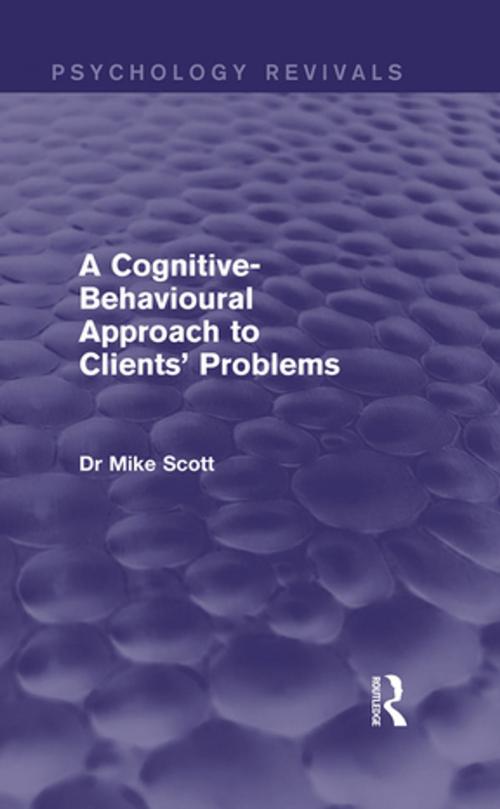A Cognitive-Behavioural Approach to Clients' Problems (Psychology Revivals)
Nonfiction, Health & Well Being, Psychology, Psychotherapy, Mental Health| Author: | Michael J. Scott | ISBN: | 9781317512646 |
| Publisher: | Taylor and Francis | Publication: | March 27, 2015 |
| Imprint: | Routledge | Language: | English |
| Author: | Michael J. Scott |
| ISBN: | 9781317512646 |
| Publisher: | Taylor and Francis |
| Publication: | March 27, 2015 |
| Imprint: | Routledge |
| Language: | English |
The most useful therapy is one that can be applied to a wide range of client problems, is easy to learn, and produces lasting results following a brief intervention. The cognitive-behavioural approaches described in this volume probably come nearest to this ideal.
Originally published in 1989, this book begins with a description of the cognitive-behavioural revolution that had taken place in the decade prior to publication and provides therapists with the specifics of helping in four major areas: child behaviour problems, emotional disorders (depression and anxiety), interpersonal problems and addictive disorders.
Coverage of the major areas of concern begins in each case with an overview of theory and research in the specific domain, followed by detailed guidance for practice. The volume represents a synthesis of the author’s research and practice with patients in inner city Liverpool and with employees referred by major employers. The strategies described have been devised to take account of a wide variety of client social contexts and service delivery settings, and the strengths, pitfalls and practicalities of group cognitive-behavioural approaches are also discussed.
The reader is finally led into largely uncharted waters, the application of cognitive-behavioural approaches to schizophrenia, people with learning difficulties and the elderly.
Back in print, this title will still be of interest to students and practitioners in social work, clinical psychology, and community psychiatry.
The most useful therapy is one that can be applied to a wide range of client problems, is easy to learn, and produces lasting results following a brief intervention. The cognitive-behavioural approaches described in this volume probably come nearest to this ideal.
Originally published in 1989, this book begins with a description of the cognitive-behavioural revolution that had taken place in the decade prior to publication and provides therapists with the specifics of helping in four major areas: child behaviour problems, emotional disorders (depression and anxiety), interpersonal problems and addictive disorders.
Coverage of the major areas of concern begins in each case with an overview of theory and research in the specific domain, followed by detailed guidance for practice. The volume represents a synthesis of the author’s research and practice with patients in inner city Liverpool and with employees referred by major employers. The strategies described have been devised to take account of a wide variety of client social contexts and service delivery settings, and the strengths, pitfalls and practicalities of group cognitive-behavioural approaches are also discussed.
The reader is finally led into largely uncharted waters, the application of cognitive-behavioural approaches to schizophrenia, people with learning difficulties and the elderly.
Back in print, this title will still be of interest to students and practitioners in social work, clinical psychology, and community psychiatry.















